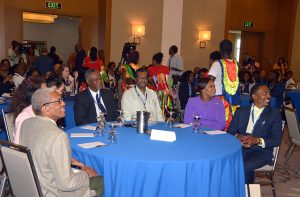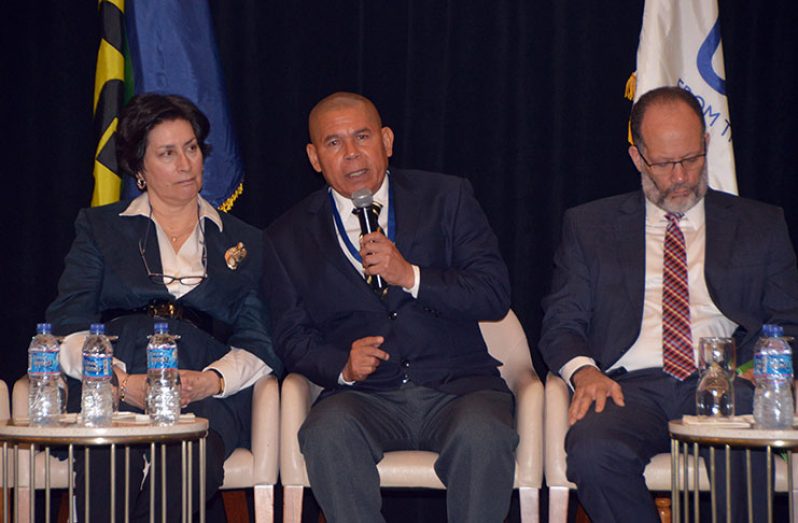…CARICOM SG says problem demands regional solution
AMID rising levels of youth violence in the Caribbean, stakeholders are meeting here to strengthen their advocacy and efforts in curbing the scourge and, Secretary General of the Caribbean Community (CARICOM) Irwin LaRocque says it is a regional problem that demands a regional solution.

The forum is the Caribbean Summit on Youth Violence Prevention being held at the Marriott Hotel, Georgetown. The main aim of the summit is to facilitate engagement on the Caribbean Youth Action and Advocacy Agenda on Violence Prevention (AAA) document, which seeks to provide guidelines on curbing youth violence in the region. It is expected that this document will thereafter be considered and actioned by Caribbean governments and policymakers.
On Tuesday, the opening day of the two-day summit, ministers and dignitaries from several Caribbean countries joined a host of stakeholders, including youth, to discuss the way forward on Youth Violence Prevention efforts and reinforce the call to action. The forum, which ends today, has attracted leaders from youth movements, governments, civil society, developmental organisations and academia, to design transformational youth-centered action to combat crime and violence and, address constraints that youth activists face in improving safety outcomes in their communities.
The summit was convened by the U.S. Agency for International Development (USAID) in partnership with the Government of Guyana, the CARICOM Secretariat, UNICEF, the Caribbean Development Bank, the Commonwealth Secretariat, the Organisation of Eastern Caribbean States Commission, and the Learning for Youth Networking & Change Sessions (LYNCS).

Secretary General LaRocque in his remarks at the summit’s opening, stressed that in tackling youth violence in the Caribbean, young people must be treated as equal partners, since they are mostly affected. “Fora such as these provide an opportunity for our youth to be fully involved in providing solutions to problems that affect them”, the Secretary-General said. “The engagement of youth at all levels of the decision-making process is critical for the successful outcome of interventions.”
Speaking broadly on crime and violence in the Caribbean, LaRocque related: “Crime and Security is an issue that is having an impact on all our Member States. It is a regional problem that demands a regional solution.” He explained further that the Caribbean has some of the highest figures of youth convicted of crime. In fact, 80 per cent of prosecuted crimes were committed by youth 19 to 29 years old, according to the United Nations Development Programme (UNDP)’s 2012 Caribbean Human Development Report on Citizen Security.
In light of these findings, he reminded that the Caribbean Heads of Government approved the CARICOM Crime and Security Strategy in 2013, which incorporates the CARICOM Social Development and Crime Prevention Action Plan-and was used by LYNCS in drafting the AAA.
The secretary-general highlighted that through this, several interventions were made since then through projects and programmes, geared at curbing crime and violence in the region. Here, there was also specific promotion and support for youth-led violence prevention initiatives.
“I am of the firm view, however, that notwithstanding the value of the projects and programmes that are put in place, the core of this battle must be fought in the home. Families have a vital role to play in turning the tide of this struggle,” he posited. “The first intervention must be in the home. It is there that our youths are first socialised.”
LaRocque was questioned by the young people involved in crafting the event, on how CARICOM will work to curb youth violence. “This work is going to continue. I only wish I had more resources to be able to engage more with the youth in what we do. The only constraint I have is a resource constraint, not one of a will to do so,” LaRocque said, and affirmed that he will advocate alongside the youth.
Minister of Social Cohesion, with responsibility for Culture, Youth and Sport, Dr. George Norton postulated that governments also have a great role to play in curbing youth violence.
“Our governments must be committed to the cultivation of an environment that will foster youth participation and inclusion in the development of policies, legislation, strategies and other interventions, aimed at addressing barriers and challenges to the realisation of a peaceful and secure nation,” Norton said.

These programmes must also provide an avenue for youths to work off aggression, relieve stress, pent up frustrations and anger, that they are too often plagued by and experienced while growing up, according to Norton.
“In this regard, the various programmes and services must be aimed at fostering peace and cohesion among our young people, and the nation as a whole, as well as bringing youth-oriented approaches to violence prevention on the front burner,” the minister noted. He highlighted that these programmes could integrate sport and recreational activities, edutainment and cultural programmes, mentorship and counselling programmes, the creation of more youth-friendly spaces across the countries and practical and life skills training.
Notwithstanding measures needed to be undertaken by the government, Norton contended that peace-building cannot be a measure undertaken by governments alone. It is “everybody’s business” and it requires concerted efforts across all stakeholders.
DRAFT DOCUMENT
Meanwhile, co-chair of the Learning for Youth Networking & Change Sessions (LYNCS) Asha-Gaye Cowell, shared that this body worked to create this document, which is now in the final draft stage.
“When we first started, we knew we wanted a document [to guide youth violence prevention efforts] but we did not know what we wanted,” she said, speaking exclusively to the Guyana Chronicle. The Jamaican youth explained that the creation of the document was, however, anchored in the Caribbean Community (CARICOM)’s Social Development and Crime Prevention Action Plan.
“After we compiled everything we have from the various methods of consultations, back and forth- back and forth, we condensed those into the document which we have now,” Cowell said. “It is for policymakers and it is for youth, made by youth.”
Cowell highlighted, that throughout the prerequisite process of engagements to create this document, youth were involved in the discourse. “We are the ones that are affected, and we need to cut it down piece by piece, with peace, and this [document] will allow policymakers, youth and practitioners some guidance and direction on how we can counteract some of the issues we have been facing,” she underscored.
Through the summit, regional representatives will have the opportunity to share their thoughts on how the document can be improved. Thereafter, it is hoped that it will receive the buy-in of the policymakers of various Caribbean countries.
Co-chair Kurba Marie Questelles also indicated that the forum and document in focus, is all part of multisectoral efforts to create a culture of peace. “As a society, we usually focus on reactionary mechanisms instead of preventative ones,” Questelles said. According to her, the time is now for an enabling environment and for positive youth development and crime and violence prevention is needed.




.png)









